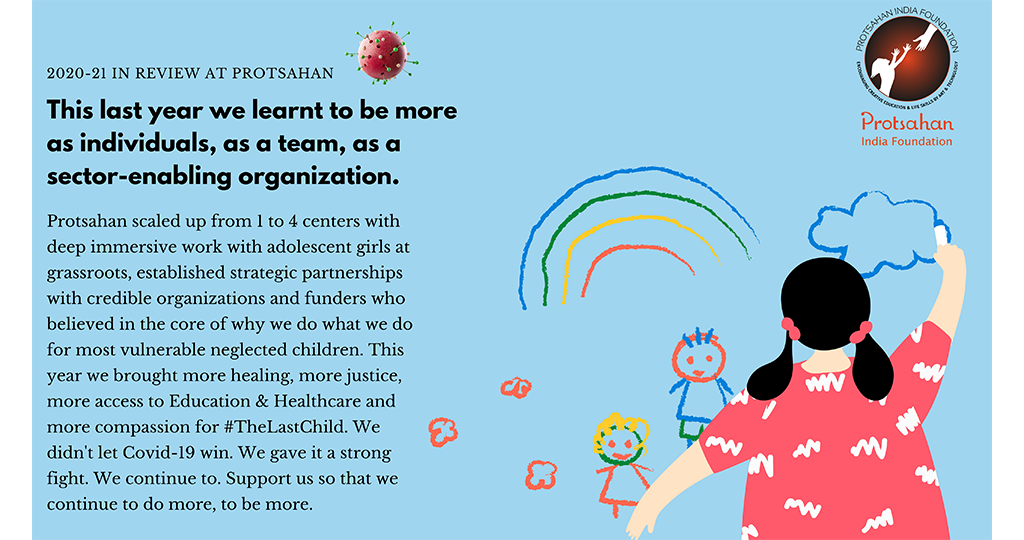
Author: Sanhati Banerjee, Payal Rani & Preeti Poddar
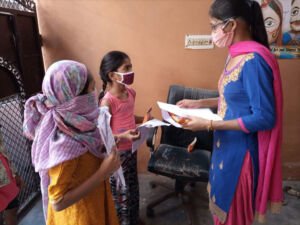 “My parents were discussing that since schools are shutdown, they should get me married. I am 14.
“My parents were discussing that since schools are shutdown, they should get me married. I am 14.
I want to study. I want to learn English and Computer Science. Protsahan child care officers came to my home and convinced my father about my studies when my father had burnt my school textbooks. I go to my Protsahan digital center 6 days a week, to download my pending school homework and have applied for ration through government schemes for my family. I was able to get 32 kgs of basic ration from the Delhi government because I learnt how to apply with my Aadhar card and phone number with Govind bhaiya’s (elder brother) help at the digital center. I will not give up. I will defeat the coronavirus.” — Renu, 14.
As evident from Renu’s narrative, Protsahan India Foundation intervened at a crucial juncture of her life and convinced her family to let her continue with her studies. The 14-year-old’s strong vision to learn English and Computer Science is not a wish; it is her right, and most importantly a wing to her dream of self-sufficiency. This story is woven into the DNA of the organization’s Digilab intervention that steers girls like Renu to self-empowerment based on approaches of STEAM. Even a basic thing like availing ration for her family through an application using her Aadhar card became a moment of triumph for Renu. “I will not give up.” – Her words echo in our ears and sum up the underlying spirit of our impact in major part of 2020. These months were some of the most critical ones in recent times as the direct global, local and community-level outcomes of the unprecedented coronavirus pandemic threw us in the face of uncharted challenges. As we faced those challenges it required some course-shifting on our part to provide urgent interventions especially in the sectors of food security and medical care apart from continuing to mainstream our child protection advocacy against abuse and neglect. However, even as it was daunting for the organization, we delivered, as there were girls like Renu waiting for us, looking for support and solidarity. And, these became our success stories written in hope and cheer all of 2020.
At Protsahan we feel its important to document the on-ground relief response work undertaken by our on-ground corona warriors in the urban slum colonies of west Delhi’ specifically from March 28 to August 30, 2020, the time when the world was reeling under the unprecedented wake of the coronavirus. Notably, the Protsahan Learning Center transformed into a Community Relief Hub to fulfil basic humanitarian and daily needs of adolescent girls and their direct communities-39 Communities (26700+ households in urban slums).
Food Security Delivered with Dignity: Addressing Children’s Right to Nutrition Even During the Pandemic
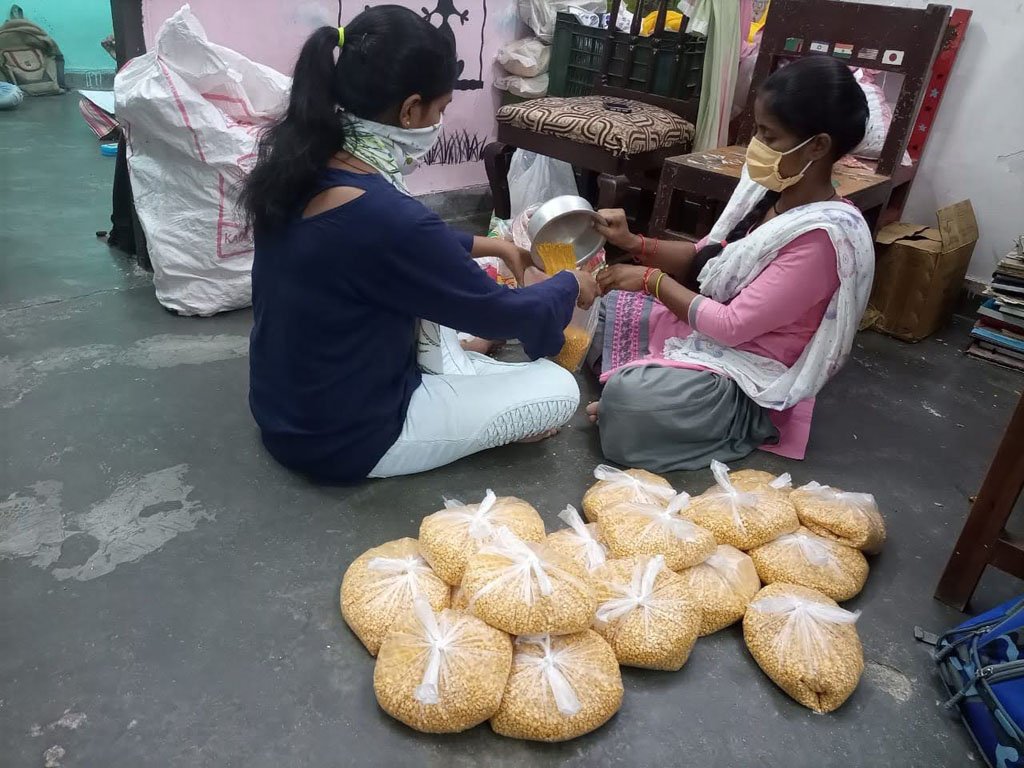 Our aim was not only to deliver essential services like cooked meals and sanitary napkins to diverse communities of adolescent girls but to enable them to continue to realize their full potential in accessing education and life skills. Above all, to design and deliver nutrition packages with an overarching outlook of empathy that treated the recipients with respect and dignity and never as needy. By providing grade-wise learning kits and protein kits including nutritious soyabean and pulse weekly packs during the pandemic to 450+ adolescent girls in the Uttam Nagar and Dwarka areas of New Delhi, we ensured that vulnerable sections of girls had access to not only hunger mitigation and but also to rightful nutrition. Such pro-protein nutrition measures counter already disproportionate access to nutrition in the case of adolescent girls of distressed socio-economic backgrounds that further ran the risk of being pushed to the margins during the sharp economic downturn owing to the pandemic. In another instance, at a Dwarka Mor food distribution center when team members asked children waiting for their daily supply of food packets if they needed more, they “very firmly and lovingly” told team Protsahan to distribute to those who don’t even have access to one packet. It is our underlying mission to never lose sight of this instinctive honesty and “innocence” of children and to let it inform our adolescent-justice psycho-social programs. This is what we call Protsahan’s “Empathy at Scale”.
Our aim was not only to deliver essential services like cooked meals and sanitary napkins to diverse communities of adolescent girls but to enable them to continue to realize their full potential in accessing education and life skills. Above all, to design and deliver nutrition packages with an overarching outlook of empathy that treated the recipients with respect and dignity and never as needy. By providing grade-wise learning kits and protein kits including nutritious soyabean and pulse weekly packs during the pandemic to 450+ adolescent girls in the Uttam Nagar and Dwarka areas of New Delhi, we ensured that vulnerable sections of girls had access to not only hunger mitigation and but also to rightful nutrition. Such pro-protein nutrition measures counter already disproportionate access to nutrition in the case of adolescent girls of distressed socio-economic backgrounds that further ran the risk of being pushed to the margins during the sharp economic downturn owing to the pandemic. In another instance, at a Dwarka Mor food distribution center when team members asked children waiting for their daily supply of food packets if they needed more, they “very firmly and lovingly” told team Protsahan to distribute to those who don’t even have access to one packet. It is our underlying mission to never lose sight of this instinctive honesty and “innocence” of children and to let it inform our adolescent-justice psycho-social programs. This is what we call Protsahan’s “Empathy at Scale”.
Accelerating Respectful Care at the Grassroots: Delivering Critical Interventions for Mothers and Children
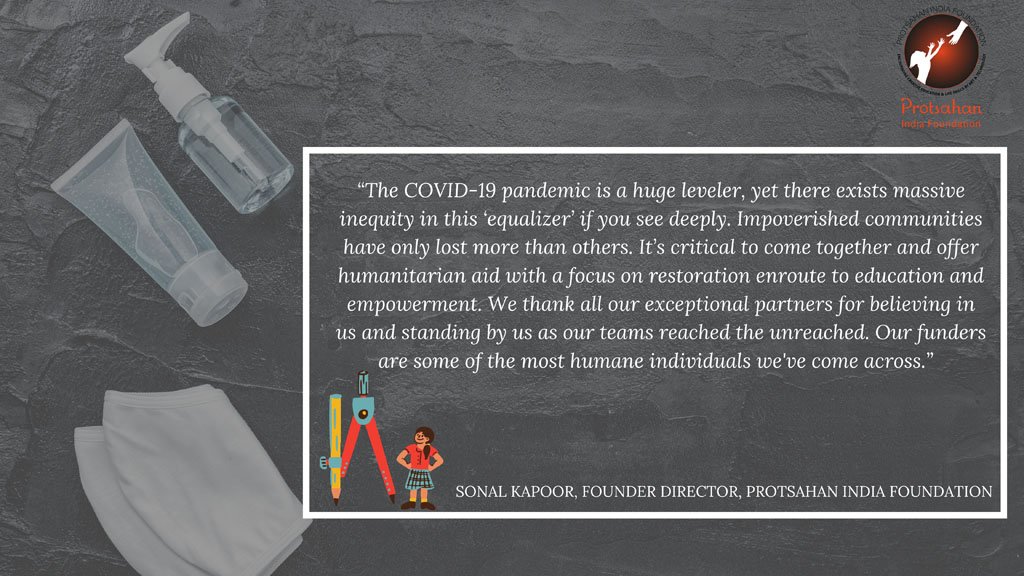 During the phase-1 relief work, our team met 24-year-old Fatima who has three children and was pregnant with her fourth child. She lives with her family in a slum area near the Gurudwara Road near Hastsal village in Delhi’s urban slum cluster. She was in the ninth month of her pregnancy and was soon expected to go into labor. However, at that time, she was experiencing a lot of concerns, which were only exacerbated by the ongoing pandemic. Her husband was not able to work due to illness. The fear of her children contracting COVID-19 had made matters worse for her. Her children didn’t have food to eat and proper clothes to wear. When our grassroots team enquired about her understanding about sexual and reproductive health, she didn’t understand and mentioned she is uneducated and never had a chance nor understanding to go to a school and sadly was repeating the same fate for her children by keeping them uneducated. She discussed the possibility of accessing contraceptive options and wanted to know more about family planning. She out of her own accord, then said, that only when she is equipped with knowledge on critical information will she be able to take care of her next generation. Our grassroots worker made sure we provided children’s innerwear for her kids. We gave her the dry ration kit so that she could feed herself and her family for another 30 days.
During the phase-1 relief work, our team met 24-year-old Fatima who has three children and was pregnant with her fourth child. She lives with her family in a slum area near the Gurudwara Road near Hastsal village in Delhi’s urban slum cluster. She was in the ninth month of her pregnancy and was soon expected to go into labor. However, at that time, she was experiencing a lot of concerns, which were only exacerbated by the ongoing pandemic. Her husband was not able to work due to illness. The fear of her children contracting COVID-19 had made matters worse for her. Her children didn’t have food to eat and proper clothes to wear. When our grassroots team enquired about her understanding about sexual and reproductive health, she didn’t understand and mentioned she is uneducated and never had a chance nor understanding to go to a school and sadly was repeating the same fate for her children by keeping them uneducated. She discussed the possibility of accessing contraceptive options and wanted to know more about family planning. She out of her own accord, then said, that only when she is equipped with knowledge on critical information will she be able to take care of her next generation. Our grassroots worker made sure we provided children’s innerwear for her kids. We gave her the dry ration kit so that she could feed herself and her family for another 30 days.
It was the grassroots teams led by Preeti (head center coordinator) and Payal Rani (senior social workers and child rescuer) that, in similar other instances, stepped up food distribution and care-administration for some of the most vulnerable sections of society, mainstreaming the needs of those who were left out from the fold of care at the time of a deep humanitarian crisis. Protsahan’s grassroots warriors Payal and Preeti directly intervened in cases of gender-based violence (GBV), child sexual abuse and incest, child marriages and child trafficking. They championed child protection right at the level of communities by stopping early marriages, child abuse, helping girls pay their school fees, etc. Several arts- and photography-based workshops were carried out to spread light and love in the lives of young girls and their families in some of Delhi’s “darkest” lanes/ghettos as the poverty- and neglect-ridden pockets are unceremoniously referred to as.
As Protsahan’s youth peer leaders (badi didis or elder sisters) conducted art-based guided counseling sessions on origami, creative livelihood, jewelery making, sexuality and reproductive rights, safe/ unsafe touch sensitization, and on how to report to which competent authority, it steered our core belief that justice and child protection are the core tenets of healing a child struggling with trauma, assisting her recovery and mainstreaming back to education systems and community. The team also got trained on community health precautions with partner organizations to be able to deliver these trainings effectively.
Meet Protsahan’s Heroes
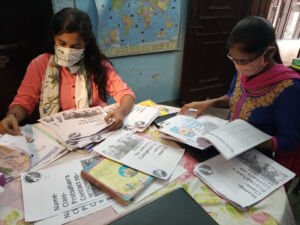 Meet Radha, Mala, Sony & Priyanka Kumari, young community graduates, also first-generation girl learners from their respective families who work as primary teachers and youth peer leaders in 6 slums at Uttam Nagar with Protsahan India Foundation. During COVID-19 lockdown, they were one of the first to respond and take on key leadership roles in providing learning kits and protein kits to about 136 girls who were at the risk of completely been thrown out of the education paradigm. key psychosocial first aid and counseling was provided right where it mattered at the last mile. They not only learnt on their own how to design exciting education worksheets on Canva and Adobe Spark software, right at the height of the pandemic induced lockdowns, but also constantly followed up with those 136 girls on core child protection case documentation, so that no little girl faced any pressing protection and education issues during the pandemic. Radha and Priyanka are Protsahan’s heroes. Mala and Sony are Protsahan’s heroes.
Meet Radha, Mala, Sony & Priyanka Kumari, young community graduates, also first-generation girl learners from their respective families who work as primary teachers and youth peer leaders in 6 slums at Uttam Nagar with Protsahan India Foundation. During COVID-19 lockdown, they were one of the first to respond and take on key leadership roles in providing learning kits and protein kits to about 136 girls who were at the risk of completely been thrown out of the education paradigm. key psychosocial first aid and counseling was provided right where it mattered at the last mile. They not only learnt on their own how to design exciting education worksheets on Canva and Adobe Spark software, right at the height of the pandemic induced lockdowns, but also constantly followed up with those 136 girls on core child protection case documentation, so that no little girl faced any pressing protection and education issues during the pandemic. Radha and Priyanka are Protsahan’s heroes. Mala and Sony are Protsahan’s heroes.
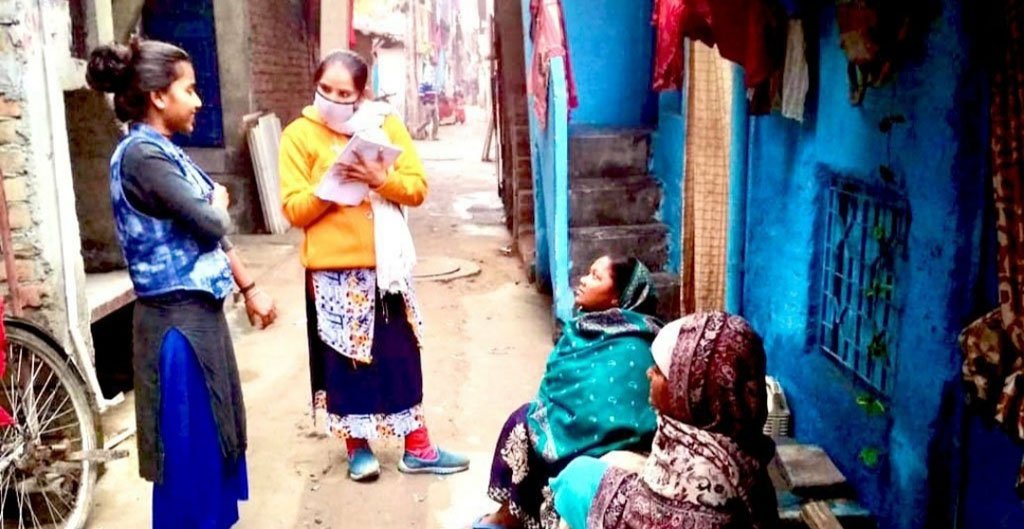
Another Protsahan star is volunteer Rihanna, whom we happened to meet coincidentally during our COVID-19 relief work. Rihanna happens to be a mother of 4 children and comes with a deep understanding of community rights and entitlements. With Protsahan’s support and guidance, she single-handedly provided access to services to over 640 women and girls. Rihanna was influential in finding out cases where young girls were selling their bodies for Rs. 150-200 for the lack of food in their homes. With her help, Protsahan was able to reach over 67 cases of sex trafficking and offer food security support until the lockdowns relaxed and they were able to go back to their jobs. She is now being trained on child rights law by our Uttam Nagar social workers so Rihanna can carry these learnings and strengthen child protection in another 16 slums in and around Dwarka, in New Delhi. Protsahan salutes the compassion and spirit of Rihanna.
Prioritizing Digital Infrastructure for Adolescent Girls
 “Ma’am, my notebooks are over. The new session in school has begun. Home is being run on debt. Mother says, we don’t have money for stationary/education. Food is first priority,” Sujli, 12-year-old girl beneficiary at Protsahan.
“Ma’am, my notebooks are over. The new session in school has begun. Home is being run on debt. Mother says, we don’t have money for stationary/education. Food is first priority,” Sujli, 12-year-old girl beneficiary at Protsahan.
“Ma’am, our mobile doesn’t have WhatsApp (it’s not a smartphone). I am missing out on my education,” Kamli, 14-year-old girl beneficiary at Protsahan.
Team Protsahan responded to such compelling calls from children in about 46 slums and their frontline workers by opening the slum digilab with strict covid protocols as prescribed by the country’s health ministry and WHO guidelines, for an 6-hours everyday to provide hundreds of girls access to downloading and printing relevant school material, submitting it online and taking classes uninterrupted along with preparation for key competitive exams post high school (where selection often makes or breaks careers of young people), learn coding and apply for government schemes online to avail other benefits for their families during lockdown, etc. Due to the lockdown, our “STEM Digilab” project had initially remained shut all of April and May 2020, but had to restart on June 10 with all safety protocols in place.
Team Protsahan’s continuing commitment towards capacity building of the digital infrastructure ensured that marginalized adolescent girl communities were not further pushed away from the mainstream in digital learning access during the pandemic. It’s important to understand that not everyone has access to digital classrooms and while digital or technology has the capacity to empower and thereby mitigate class and caste-based prejudices and inequities; the first bridge is to create equal opportunities through scaling up access without any additional cost.
Critical Concerns Delivered

- Dry Rations and Cooked Meals: Protsahan provided dry rations support to 10,000 families of daily wage workers, sex workers, manual scavengers and more who lost their livelihoods due to the precautionary COVID-19 lockdown. Protsahan also provided about 4,12,350+ cooked meals to people who were stranded and stuck without access to cook. The estimated outreach for this last-mile delivery of dry ration is 1,61,781+ individuals with dry rations for a month or more (average) in the lockdown period from March 26, 2020 onwards until July 31, 2020.
- Psychosocial support: For an empathy-based “psychosocial support logistics”, Protsahan’s social workers were in direct contact with the children in the communities where the team worked through phone calls and WhatsApp, and served as the contact points of direct ration distribution in more than 19 communities in Delhi from just March to August 2020. Scores of more communities were added subsequently that were supported till Oct 2020 until the lockdowns eased and they started going back to work.
- Children’s psychological care manual: Protsahan designed a children’s psychological care manual for UNICEF and Childline 1098. The manual focuses solely on the psychosocial care of children working in its way to disrupt the existing bias that mental health concerns are only for the upper-caste, knowledge-elite and rich classes. It raises awareness about the prevention of systemic violence in spaces where children stay (child care institutions, homes, NGO shelters etc.) and are perceived to be safe in traditional cognizance. It also sensitizes readers and primary caregivers as well as social and legal stakeholders towards the rising instances of mental health implications. Implications that are rising due to an augmented lack of access to health, nutrition and education, dignity and access to channels of safety and healing owing to the pandemic, increased stay-at-home, loss of parental income and the fear of the coronavirus and its associated stigma against marginalized communities.
- Access to medical services for pregnant women: We specifically worked to provide access and resources to pregnant women to access medical services for safe deliveries. The adolescent-girl advocacy platform also leveraged its strong networks and local partnerships with ASHA (Accredited Social Health Activist) workers and police authorities to make this help available through access to services of midwives and doulas.
- Legal counselling for child abuse and gender-based violence: Additionally, we critically provided psycho-social first aid and legal counselling on child abuse and sexual and gender-based violence cases that affected its direct communities and those of its partner organisations during these times in partnership with local police authorities.
Strategic Collaborations with Government and key UN Organizations
During this phase, Protsahan also supported key government machineries by building capacities of their frontline functionaries (Childline 1098, Juvenile Justice Boards, Child Welfare Committees, etc.). This collaborative work was aimed at developing the scale so as to never lose focus on adolescent issues even during the trying times of COVID-19 when resources were already scattered and scarce. Protsahan also built strategic collaborations by strengthening our own networks to create relevant inter-NGO alliances like the partnership with Noora Health at the grassroots.
………………………………………………………………………………………………..
Impact at a glance:
4,12,350 individuals reached with hot meals
39 urban and rural communities served
1,61,781 individuals provided with dry ration
3,610 people reached with psychological support
………………………………………………………………………………………………………………
With inputs from Protsahan India Foundation’s in-house report
All on-ground stories captured by the grassroots team of Protsahan—Preeti Kumari and Payal Rani, and translated by Ruchika

